
Motorhome rules in Spain: what do I need to bear in mind?
17 October, 2017 | Update: 27/05/2025
The Spanish Costas, cities like Madrid, Valencia and Barcelona, the Mediterranean climate or the countryside and the Spanish interior. We can all find a reason to visit Spain, and every year thousands of Europeans head for this beautiful holiday destination with their motorhome. But what about the traffic rules in Spain? When travelling in Spain with your motorhome, what are you allowed to do, and what aren’t you allowed to do? Spain has introduced new traffic rules as of March 2022. What has changed?
New traffic rules since March 2022
- Hands off your smartphone: the use of a mobile phone is now subject to stricter penalties in Spain. You can be fined €200 for using your mobile phone while driving. Only in a car park is a driver allowed to hold their phone.
- Don’t overtake too fast: when overtaking, you may not exceed the maximum speed limit. You used to be able to go 20km/h over the maximum speed limit, however, that no longer applies.
- If you do not adhere to the obligations to wear seat belts, helmets or use child safety seats, there are fines from €200.
- When overtaking cyclists, you must maintain a 1,5-metre distance. If there are two or more lanes going in the same direction, you must change lane. When overtaking, you must reduce your speed to 20km/h under the maximum speed limit. Therefore, on a road where you can drive 90 km/h, you overtake a cyclist at 70 km/h.
- Please note: if you are registered as a resident in Spain because you live there (part of the year) , then your driving licence is subject to a point system and you can lose points with the above violations. Most drivers start with 12 points. If you lose all your points, you cannot drive for six months.
Toll roads in Spain
Most roads in Spain are free to use, but there are a few toll motorways. An “autovías” is the same as a motorway, except that it can be used by agricultural vehicles and bikes when there’s no alternative. Toll roads in Spain are identified by the letters AP (autopistas), while toll-free motorways are identified by the letter A (autovías). See a list of toll roads and rates at Autopistas.com (website in Spanish).
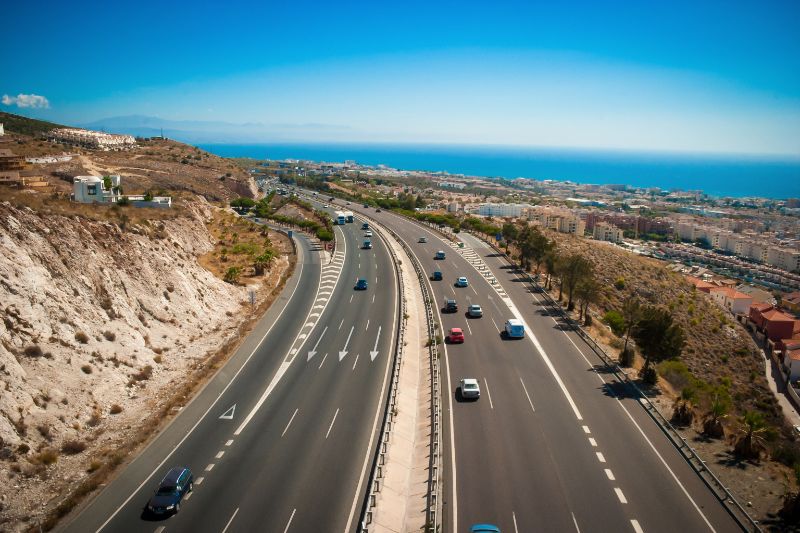
A part of the AP 7 near Malaga is now toll-free.
Staying overnight, camping and parking
You can’t just go ‘camping’ anywhere in Spain. Wild camping may be allowed under some conditions, and checks are not strict everywhere, but in principle, you’re only permitted to stay overnight at parking spaces designed for motorhomes, or at campsites or at vineyards or farms for example. Wild camping is not permitted at any of the national parks in Spain.
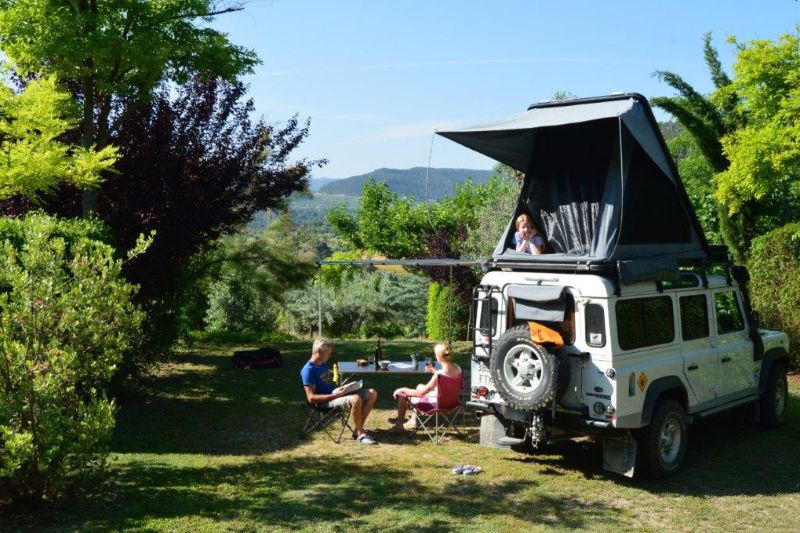
Stay at one of the beautiful small campsites in the spanish hinterland. (Photo: Campsite La Fresneda in Aragón)
Parking a motorhome is allowed anywhere, provided that the parking space is suitable and there’s no sign banning the parking of large vehicles. Eating and drinking and sleeping in a parked motorhome is fine (even cooking is fine), but you’re not allowed to convert a parking space into a ‘motorhome pitch’. That means that you can’t set up tables and chairs outside, that the awning must remain folded up, and that you can’t put up your TV dish. It’s also true that these rules are not enforced equally strictly all across Spain.
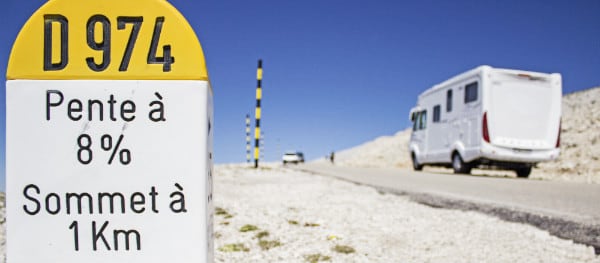
Driving with your motorhome through Spanish mountains
Uphill, downhill
The Spanish countryside is very diverse. From touristy beaches to the unspoiled hills, Spain has it all. If you’re driving through the hills in your motorhome, bear in mind that there are some traffic rules that differ from the normal rules. On slopes with more than 7% incline, vehicles going up always have priority over vehicles going down (unless the vehicle going up is close to a passing place), and on mountain roads, it’s mandatory to sound your horn on blind bends.
In areas like the Pyrenees and the Sierra Nevada, you can sometimes encounter wintery conditions. The use of snow tyres isn’t mandatory in Spain, but it is recommended for these areas in wintery weather. Snow chains may only be used on roads covered in snow or ice, and their use is mandatory if indicated by signs or by the police (maximum speed when using snow chains is 50 km/h). If you’re using studded tyres, the studs cannot protrude more than 2mm.
Speed
In Spain, motorhomes (<3500 kg) are seen as category 1 (M1) vehicles, and because of this, different speed limits apply to them outside of urban areas. A motorhome is not allowed to drive faster than 120 km/h in Spain. The following are the speed limits on Spanish roads.
Speed Limit in Urban Areas:
Effective immediately, a general speed limit of 30 km/h applies to most urban roads in Spain. The exact maximum speed in cities now depends on the number of lanes. On roads with two or more lanes in each direction, the speed limit remains unchanged at 50 km/h. On roads with a single lane for both directions, without a central road marking and with sidewalks at the same level (without a difference in height), the speed limit is 20 km/h.
Cars and Motorcycles:
- Within town: 30 km/h
- Outside town: 90 km/h
- Expressways: 100 km/h
- Motorways and Autovías: 120 km/h
Motorhomes up to 3.5 t:
- Within town: 30 km/h
- Outside town: 80 km/h
- Expressways: 90 km/h
- Motorways and Autovías: 120 km/h
Motorhomes over 3.5 t:
- Within town: 30 km/h
- Outside town: 80 km/h
- Expressways: 80 km/h
- Motorways and Autovías: 90 km/h
Driving with kids in Spain
Children under 1.35 metres are not allowed to sit in the front, and are only allowed to sit in the back (in an approved and appropriately-sized child seat). Children who are taller than 1.35 metres are allowed to sit in the front and use a normal seatbelt. However, in Spain it is advised that children up to about 1.50 metres tall use an approved, appropriately-sized child seat or booster seat. Pets must either be restrained using a dog seatbelt, or they must be transported in a crate or box (of course, this should also be fixed somewhere so that it doesn’t move around in case of an accident). Neither passengers nor pets are allowed to walk around when the motorhome is moving.
Good to know
Finally, here’s some useful information and handy tips for those who are planning a trip to Spain:
-
- Spain has a number of environmental zones (including in Madrid and Barcelona) where only residents are allowed to drive. These zones are indicated with signs with the text ‘Area de prioridad residencial‘ and are only accessible for permit holders and drivers with special exemption (so don’t drive here in your motorhome!).
- In Spain, there are special petrol stations with additional amenities for motorhomes (Special Service Stations). For example, waste disposal for the toilet, water connections, and possibly technical help.
- Diesel (gasóleo) and petrol (gasolina) are easily available at petrol stations. LPG however is not easily available (the exception is in Madrid). See this list of petrol stations offering LPG in Spain.
- A warning triangle, a set of spare bulbs and reflective safety vests (for every occupant) are mandatory. Cars with Spanish registration plates must have two warning triangles on board.
- If you are carrying cargo (including bikes) you must have a warning sign of 50 cm x 50 cm.
- Drivers who wear glasses must have a spare pair with them.
- In Spain, it is not permitted to fill foreign gas cylinders. So, before you travel, search for a list of where you can buy gas cylinders and check what the exact rules are.
- Speed camera warnings for fixed speed cameras are allowed; radar detection devices are not allowed in Spain.
- The permitted amount of alcohol is 0.5 promille. Except for novice drivers who have had their licence for a maximum of two years; for them, the maximum amount is 0.3 promille.
What are your experiences of driving in Spain? Or do you have tips or suggestions for others? Then leave a comment under this message.
Want to stay informed with fun and useful camping news? Then sign up for the Eurocampings newsletter!







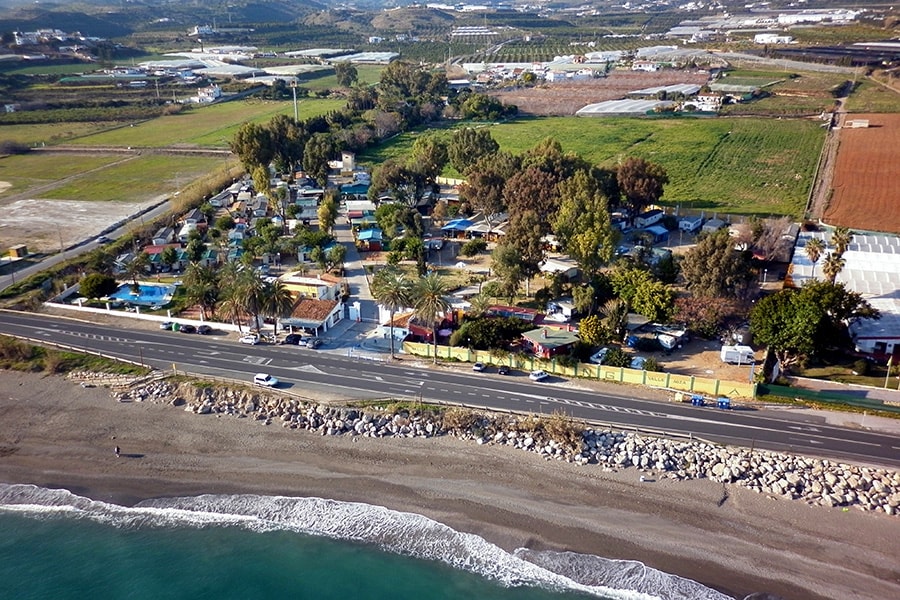

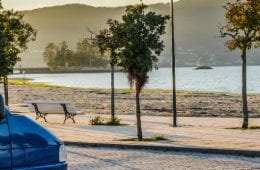


43 Comments
Hi .Looking at the AP tariffs ,on the AP website you linked to . there are three bands of prices. Do you know what they are please ?
Another thing is earphones – wear them while behind the wheel, instant €100 fine. Blighters did me for this a couple of years ago.
Hi how are you? I hope we’ll. I wanted to know if you could help me with an enquiry:
I have a normal car driver license in Dubai, United Arab Emirates and I’m looking to visit Spain next month and rent a motor home less then 3500kg, is that an ok driver license to use?
Thanks
Hi Nicolas,
A motor home less than 3,5 is ok for a normal car drivers licence in the EU. This is drivers license B.
However, if you ar not an EU citizin, you need to obtain an international drivers permit to rent a car in Spain. You can find more information on this website: https://www.autoeurope.com/international-driving-permit-spain/. Her is also some information: https://www.spain.info/en/travel-tips/driving-regulations/#ancla-1
I would advise you to apply as soon as possible. I wish you a great motorhome trip in Spain!
Kind regards,
Marieke
will a Hymer motorhome be able to access narrow villages roads close to Huecija in Spain (Almeria)
That is entirely dependent on the van – mine can do narrow streets with relative ease but I’m always concious of the rear overhang and corners. Of more concern are the inclines, which it will do but with difficulty – normally in first – have you checked the route on the map for inclines? Where will you put the van when you get to where you want to go? Are you better trying to do it on a bike or even a rental car for the day?
I find sometimes it’s less stressful to leave the van behind and do the trail as a hike on foot!
Can I carry tin foods in my motorhome traveling to Spain
I am planning to visit Andalucia in a converted camper van, Sprinter type in September 2022. Can someone recommend books or resources for me to find cheap or free camping. Thank you
http://www.park4night.com is a very good source of information. Remember that in Spain generally, it is illegal to stay in the van anywhere other than the designated sites, and where you are, there are many, many tourist providers who don’t like motorhomes because you don’t have to pay for their hotel or campsite facilities! This means that wild camping can be difficult and even visiting a town can be challenging as your van may have no place to park – the dreaded bar across the carpark entrance!! proceed with caution!
In spain Is it legal to park my campovan which is not in use on a puplic road outside someone’s house
It has to be insured and ITV’d. We park ours outside our house on a public road, but it is a quiet area
Hello! Yes, you can park it provided it’s insured. The MoT (ITV) doesn’t have to be current as they can only do you if you are caught driving the vehicle. That being said, it is a good idea to have an ITV sticker that states the current year as it avoids problems with turbocharged neighbours – unless they lean in and inspect closely, any vehicle with a current year sticker ‘looks’ legal at a glance. The bigger problem is with neighbours who don’t like the look of your van and want it moved on – mine’s been spuriously blamed for damaging a car, causing damp in a garden wall, blocking the sun from windows, preventing people from crossing the street – the whole nine yards! Have to say that I don’t much like my neighbours!
Up in the mountains behind Málaga in the picnic areas, there is free water, we’ve used it many time, and it’s much nicer than the town
Thanks for that useful information. We’re thinking of relocating to Malaga after 20yrs in the Canaries and about to retire next year.
After touring in a campervan, we are thinking to get a permanent place in the Malaga area ie a bit of land with a house.
Interesting guide for the motorhome rules, Thanks for sharing.
I have lived here for 20 years now and you state driving is the same as UK but on the opposite side of the road. The biggest difference is the right of way on a roundabout which is very different the outside lane can go left all the way around the roundabout and the person on the inside does not have right of way if someone is turning left and in the outside lane, the person on the inside lane would have to go around again. Many UK drivers get irate at Spanish drivers, beeping and shouting when they are the ones in the wrong.
Not entirely sure you’re correct about that – tho what you describe seems to be the default learning for drivers here. I think the left-hand lane practice conflicts with a rather confusing and seemingly incomplete attempt made by the Guardia Civil and the DGT several years ago to clarify the issue:
https://www.diariomotor.com/dgt/normativa/decalogo-rotondas/
I try to drive as best I can like I learned how to do it in the UK, the one major difference that I can see is my using an indicator – there appears to be a national shortage of indicator bulbs here in Spain as drivers never tend to use them, particularly on roundabouts.
You seriously would need a rapid-action crystal ball to work out the intentions of some drivers on larger roundabouts and – while Lulu may well be correct about the right of way – it defies logic to drive in the outside lane to perform a left turn at a two lane roundabout – what is the inside lane for then? Drivers who are lost and need a couple of spins to work it out?!!
Being retired, I would like to stay in Valencia for longer than 90 days,
My residence will be a motor home on an official camp site,
Question: will I be able to obtain a long stay visa to enable this?
Hi have left my Rv in Spain but need to bring it home can I travel to Spain to fetch it back to England
It is useful information for people to visit Spain. Thank you and keep it up!
I am wanting to travel around Lanzarote in a camper for 1 week, I have seen some places say it can be parked anywhere and then other say that they can only be parked on campsites, any ideas anyone?
We are going to move to Spain, and we are travelling there in our newly purchases Motor Home to explore the areas.
How long are we allowed to stay in Spain before we have to leave with our vehicle.
And how long is it before we can go back with our vehicle.
We heard that you can only stay 9 Months before we have to take the vehicle out of the Country.
Any advice anyone.?
We are currently in Spain with our motorcaravan and have been touring for 3 months, we have just been told by local person you only have 2 months before needing to take motor home our country. We will need to find out next week when offices are open but will let you knowcresukt.
My father is hoping to retire in Spain, he’d like to live in a motor home permanently. Is this not possible? Would he need to have a fixed address over there? Or live on a site with the motor home? Anyone have any updates or know of a informative website etc?
Thanks
Regarding resident in Spain a years lease agreement for a rental property will do the job and owning a property is not compulsory.
So did you find out. I live in Spain but due to stupid Spanish laws I was hoping to take my motorhome over and leave 11 months later to not and then back again.
Why are they stupid?
By law in any EU country you may take a vehicle into another EU country providing it is road legal in the country of registration and remains so – meaning it must be taxed, hold a valid MOT, be insured; nor may you SORN it or declare it exported. You may also drive the car. However you must stay no longer than 6 calendar months and you must then remove the vehicle out of the EU country concerned. You are not allowed to renter that country for a period of at least 7 days. You may be asked to prove date of entry and exit. Your insurance may permit lo get periods – the law does not.
6 months in any eu land
Is there an upper age limit fur driving a camper an in Europe?
Are special tyres mandatary in spain
from my experience, if you have a tyre changed, their law is to have samne tyre on each side of the axle – ie, both front or both rear tyres, they cannot fit just one of a different make
This is correct.
My understanding is that you need TWO emergency triangles
Yes you do need 2 triangles
And at least one approved high visibility jacket preferably two that must be on before you step out of vehicle
Love Spain but can no longer go there until either they allow, or at least turn a blind eye, to my properly fitted, braked, A-frame towed car.
You can start going again, So long as the country you come from says its legal to have a A Frame, They have to except your country’s law in ref to the set up of your motorhome, you can download a legal text in Spanish stating the EU law, should you get stopped. enjoy!
Good site but nothing about watering the horse. I hang around Malaga since 2017 and l never found a free water for camper vans anywhere. This is so bad, nobody cares about the 1000′ of us who spend all our money in and around Spain without facilities.
There is always water in cemeteries with closes access (normally!!).
We have been staying in toromalenus right along Malagar end no charges we filled our water barrels and had shower on beach over road Mt toilet tank in manhole on park we stayed 5 weeks not posh 10 Starr rating
You will find you cannot use a A frame on UK plates as it is classed a third country now after brexit
Just one of the many benefits.